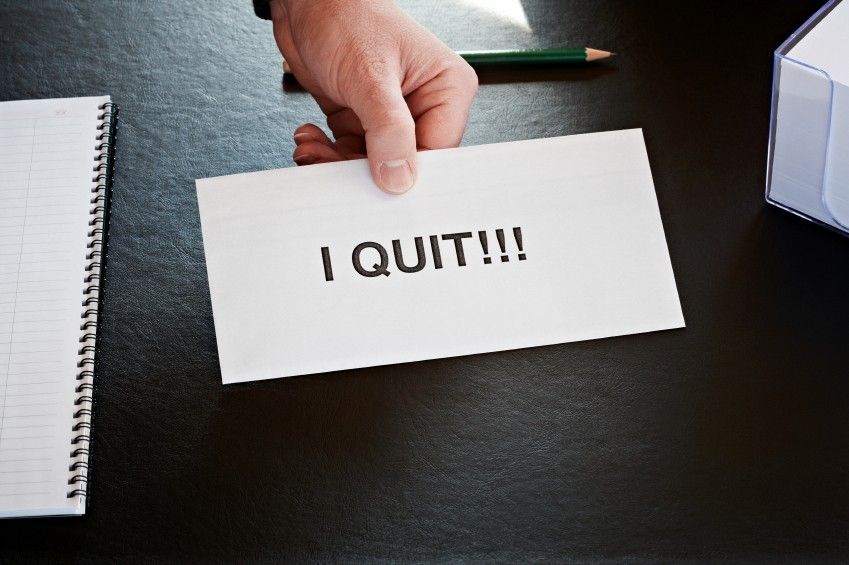 Things at your job are going terribly. You’re miserable. You think you might be about to be fired. You think a reasonable strategy might be to quit.
Things at your job are going terribly. You’re miserable. You think you might be about to be fired. You think a reasonable strategy might be to quit.
But listen: It’s almost a never a good idea to quit before being fired if you think the reason for your firing would be wrongful, for instance, based on discrimination or because you reported wrongdoing.
Just Say No to Quitting
 Generally, if you quit, you are not eligible for any lost wages, usually the biggest measure of damages in an employment case.
Generally, if you quit, you are not eligible for any lost wages, usually the biggest measure of damages in an employment case.
The only exception is if something called “constructive discharge” applies. This means that although you were not fired, conditions at your job were so bad that the law will treat you as if you were fired. But the conditions have to be really, really bad for a court to find that you have been constructively discharged.
A Constructive Discharge Case—Almost

Let me give you an example of what, incredibly, a court found was not constructive discharge.
A mother, Angela Ames, returned to work at Nationwide Insurance Company after a two-month maternity leave. She planned to pump breast milk while at work. For those who don’t know, women breastfeeding have to feed their child or pump the milk at certain regular times during the day. If they don’t, their breasts become painfully engorged with milk.
When it came time for Angela to pump, her department head, Karla Neel, told Angela that she would not be able to use the company’s lactation room because Angela had not completed the required paperwork to get a badge for the room. Angela was not aware that she needed to complete this paperwork.
Angela tried to use a company “wellness” room, but it was occupied. So, she waited.
While Angela waited, in pain, for the use of a “wellness room,” her supervisor came up, put his arm around her, and told her that everything would be okay. And he helped her find a private room.
Actually, that’s not what happened. Not even close. What really happened was that her supervisor came up to her as she waited in pain and told Angela that she would have to work overtime to complete all of the work that had piled up during her absence or be disciplined.
Understandably distraught, and now desperate for a place to relieve her painfully engorged breasts, Angela went to Neel and asked whether there was anywhere else she could find a private place to pump her milk.
The HR director looked at Angela, her eyes softened, and she said, “Of course, of course. I’m so sorry this has happened. This paperwork thing to use the lactation room is just crazy. I mean, who writes these rules? Not me, I’ll tell you. Don’t worry, we’ll get that straightened out. But, here, until we do, use my office. Come sit. Feel free to use the lock on the door. I need to go get another cup of coffee anyway! Just come grab me from the breakroom when you’re done.”
Actually, that’s not what happened. Not at all.
What really happened was that Neel, confronted with an employee in physical distress—due to the fact that she was doing her part to keep the human race going—said, “It’s not my responsibility to find a room.” She then followed up with this doozy: She handed Angela a pen and paper and told her that she should resign, saying, “I think it best that you and go home and be with your babies.”
What do you think Angela did, in pain and with the director of her department essentially telling her that she was not welcome at Nationwide? What would you have done?
Angela resigned from Nationwide.
I’m guessing what happened next was that she got home, fed her baby, got angry, cried, and then started calling family members. After she pulled herself together, looked at the stack of bills on her kitchen counter, and heard enough people say, “This can’t be right, it can’t be legal,” she called a lawyer. And the lawyer said to herself and then to Angela, “This is outrageous. I think you have a case. And if this isn’t constructive discharge, then nothing is.”
And so Angela sued. And she lost, twice.
The trial court kicked her case out before it even got to a jury, finding that even if Angela had a claim, she couldn’t bring it because she quit. Then an all-male court of appeals agreed, finding that it was no big deal that Angela’s boss said that she would have to work overtime as she waited in the hallway in pain, and it couldn’t be sex discrimination because the supervisor would have done the same to a male employee (though presumably not one distressed because he needed to pump breast milk).
As for whether Angela had a choice in the matter regarding her resignation, the men (all of whom, I’m guessing if they had kids, had a wife who had the choice to stay at home) found that, well, yes, she had a choice. Angela could have complained to human resources or to the company nurse. That way, the company would have had a chance to correct the problem. So, see? She didn’t have to get all uppity and quit.
You can read more about this case and find a link to the opinion from the Eighth Circuit Court of Appeals here.
Summing It Up
- The moral of this story is that if you can at all help it, don’t quit unless you are literally being pushed out the door or facing bodily harm.
- Ideally, you’ll see a lawyer before you do anything. He or she can help you protect your rights before you quit. He or she may be able to help you get out on leave in the meantime.
- But what if you’ve already quit? Don’t throw in the towel yet. It is possible that constructive discharge can apply to your situation.
- It is also possible that you are entitled to emotional distress damages before you quit, for instance, if you were demoted or if you experienced a hostile work environment.
So, sing it with me now: go see a lawyer!





